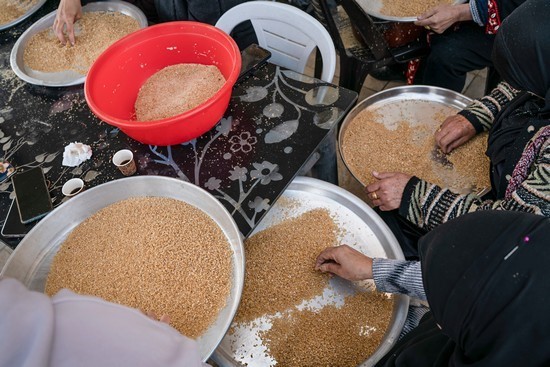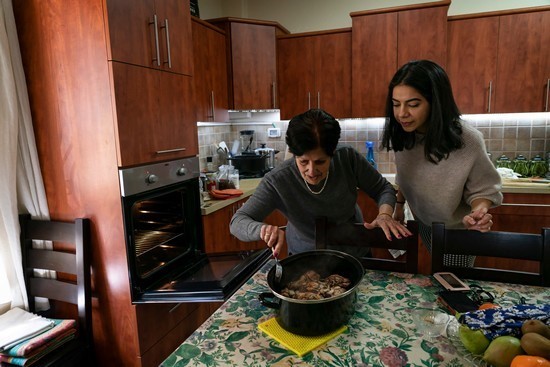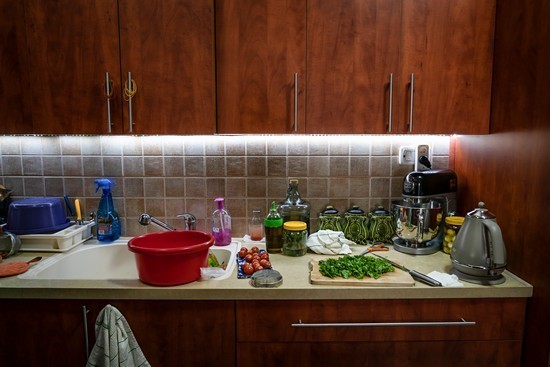A tangy scent permeated Mariam Sindawi’s kitchen as she scattered flecks of
ruby-colored sumac into a simmering pot of caramelized onions, following a
centuries-old
Palestinian recipe handed down by her mother.
اضافة اعلان
Sindawi, 82, was preparing mussakhan — flatbread
layered with onions cooked in olive oil from the village where she spent her
childhood, adorned with spice-infused roast chicken, and topped with fried pine
nuts and almonds.
Watching her every movement was her 28-year-old
granddaughter and culinary partner, Abeer Abbasi, long a keen observer of her
teta — Arabic for grandmother — in the kitchen.
As many Palestinians move away from the culinary
traditions that have been a cornerstone of their culture, family matriarchs
like Sindawi say they feel compelled to pass down their family’s kitchen
secrets.
 Trays of wheat are cleaned by women in the West Bank village of Battir, on March 9, 2022.
Trays of wheat are cleaned by women in the West Bank village of Battir, on March 9, 2022.
“It’s for preserving our traditions and making sure
they don’t get lost along the way as time passes,” Sindawi said as she gathered
the spices — star anise and cinnamon, among others — to season her chicken,
closely watched by Abbasi.
In 2021, Fadi Kattan, a Franco-Palestinian chef from
Bethlehem, traveled across the occupied West Bank and Israel in between COVID
lockdowns, recording a video series called “Teta’s Kitchen” in which he met
with Palestinian women like Sindawi and exchanged recipes and techniques.
His project, he said, was aimed at reclaiming a
cuisine that is part of a broader Arab tradition involving foods like hummus,
falafel, tabbouleh, fattoush, and shawarma that he felt was being co-opted by
Israeli cooks.
“Food is being used to normalize the Israeli
occupation by denying the origin of everything from hummus to falafel,” Kattan
said. “The images of our grandmother’s hands working in the kitchen, rolling
the vine leaves, dipping the bread of the mussakhan in oil.”
He added, “These are images of beauty that are being
stolen from us.”
There are many overlaps between Palestinian and other
Arab cuisines, and many of the hundreds of thousands of Mizrahi Jews who
immigrated to Israel from
Arab countries and North Africa in the late 1940s and
early 1950s also would have eaten foods like hummus.
But many Palestinians worry about the future of cuisine
they say is intrinsic to their identity, especially when it is categorized as
“Israeli,” which they feel denies its Palestinian or Arab origins.
In July, Ina Garten, the American author and TV
cooking celebrity, came under attack for describing on Instagram a recipe
involving hummus and fattoush as an “Israeli vegetable salad”. Last year,
contestants at a Miss Universe pageant in Israel were criticized for rolling
vine leaves with Palestinian women and calling the food they created an example
of Israeli culture. (Controversy over hummus was also featured in a new Netflix
series in which Palestinian American comedian Mo Amer lamented the existence of
a chocolate variety.)
The secret to real Palestinian cooking, according to
Kattan?
“When you knead dough, it’s what you do with your
hands — words cannot describe it,” he said. “When I ask people, ‘What’s the
secret to your cuisine?’ They say, ‘nafas’. Nafas means breath. It’s the
emotion. It’s the desire for hospitality. It’s sharing.”
 Mariam Sindawi in the kitchen of her home in Haifa, with her granddaughter Abeer Abbasi on March 16, 2022.
Mariam Sindawi in the kitchen of her home in Haifa, with her granddaughter Abeer Abbasi on March 16, 2022.
For Sindawi, when preparing dishes like mussakhan,
whose origins are unclear beyond references to it in folk songs and tales, it
is also about using ingredients steeped in tradition. Wild sumac for the onions
is essential, she said, as is the extra-virgin olive oil freshly pressed in
Jish, her ancestral village at the foot of Jabal Al-Jarmaq, near the border
with Lebanon.
“We don’t buy our olive oil from anywhere else,” she
said.
Food is being used to normalize the Israeli occupation by denying the origin of everything from hummus to falafel.
While she reveres tradition, Sindawi acknowledges
that Palestinian cooking has changed in recent years.
Much of that is the result of higher incomes among
Palestinians — allowing people to afford a broader range of food choices — and
exposure to new cuisines on television and online, which has led to some
changes in cooking practices.
Sindawi says that Palestinian cuisine has long been
associated with the use of vegetables and plants but that more meat-based diets
are increasingly common, citing the shawarma and kebab stalls that have become
ubiquitous across the occupied
West Bank.
But traditional, plant-based culinary practices are
still current among many younger Palestinians.
Izzeldin Bukhari, 37, who organizes vegetarian
cooking classes and food tours of East Jerusalem, makes a point of tapping into
the culinary knowledge of older generations.
He regularly visits with Palestinian women, most of
them wives of farmers from Bethlehem, who gather daily on the cobbled sidewalks
near the Damascus Gate in East Jerusalem to sell wild plants and vegetables.
“I get my knowledge talking to these women,” he said,
“asking what they do with the greens they sell.” Grinding unripened chickpeas
to make a pistachio-green hummus and making stew from the fibrous pods that
enclose fava beans were some of the tips he gleaned.
“Nothing is discarded,” he said, approvingly.
Fathiya Salah, 56, a vegetable seller from the
Palestinian town of Al-Khader, near Bethlehem, has childhood memories of drying
grapes in the sun to make raisins with her mother, who also taught her to
prescribe grape molasses as a homeopathic remedy for anemia.
“This generation, they don’t eat this stuff
anymore,” she said, referring to the homeopathic products that were once common
among Palestinians.
Before 1948, when more than 750,000 Palestinians
were expelled from their homes or fled as the state of Israel was created, a
mass displacement Palestinians call the nakba or “catastrophe”, about
three-quarters of the Palestinian population lived in villages centered around
agriculture.
 Vegetables prepared in Mariam Sindawi’s kitchen on March 16, 2022.
Vegetables prepared in Mariam Sindawi’s kitchen on March 16, 2022.
Some of the traditions that stemmed from that
agricultural heritage continue. Outside a house overlooking verdant hills and
ancient terraces in Battir, a village in the West Bank south of
Jerusalem, a
group of 15 older Palestinian women preparing for a wedding celebration this
year sifted through cracked wheat to remove dirt from the grain.
Plumes of dust rose as the women — some of them
wearing robes with traditional red tatreez embroidery — sang and clapped as
they readied the wheat for use in a lamb dish.
But such traditions and the social gatherings
anchoring them are gradually being lost, said Vivien Sansour, a Palestinian
conservationist from the neighboring village of Beit Jalla who is writing a
book about the practices of Palestinian farmers.
The urbanization of once rural Palestinian villages
and towns, and the difficulty of gaining access to farmland controlled by
Israel, has prompted many young people to seek better-paid work in Israeli
settlements, Sansour said. Instead of harvesting wheat themselves, families are
buying it already sifted, obviating the need for women to gather to clean it.
“Inside my hands are my ancestors’,” she said,
sweeping her fingers through the wheat in a steel pan outside the home of Umm
Hassan, the mother of the groom. “This is 10,000 years of cultivation.”
A sense of belonging and loss also infuses Sindawi’s
sentiments about the Palestinian recipes inherited from her mother.
Born in the coastal city of Haifa, she was eight
when large areas nearby, originally allocated to a putative Arab state by the
UN in 1947, were occupied by Israeli soldiers in 1948 — including her ancestral
village of Jish.
Sindawi and most of her immediate family had already
fled north across the border to Lebanon. When they returned home six months
later, they found that 18 members of their extended family had been killed, she
said, her eyes tearing up.
Many Palestinian families returned to razed homes
and slaughtered livestock.
Foraging, a traditional Palestinian practice,
suddenly became a lifeline. “We tried to be creative about our food,” Sindawi
said, “so we cooked wild plants”.
Khobeizah, or common mallow, and loof, a flowering
perennial plant with bright green leaves, were some of the edible plants found
growing wild that her mother cooked.
Sindawi is now in the twilight of her life. Taped to
the front door of her apartment, a note scribbled in Arabic reminds her:
“keys.” Her hands tremble as she removes her chicken from the oven, a side
effect of a medication she takes.
But her memories
of a time and place she yearns to return to, like making taboon bread in a clay
oven with her mother, are still vivid, she says — as vivid as the fragrance of
cinnamon and sumac rising from the modern oven she uses now as she cooks with
her granddaughter.
“Our relationship is really based around the
kitchen,” said Abbasi, who asked her grandmother for advice when she was
training in Tel Aviv to become a pastry chef.
The women worked seamlessly together in the steamy
kitchen, occasionally pausing to note down each spice and ingredient used to
create the mussakhan chicken.
“My dad said it’s very important that I learn everything she
cooks,” Abbasi said. “He literally said, ‘Write it down because you don’t know
when you’re going to need it.’”
Read more Good Food
Jordan News



